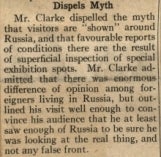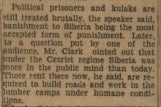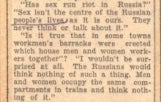Dana Porter Library, first floor
University of Waterloo Library
Waterloo, Ontario N2L 3G1
519-888-4567 x42619 or x42445
Although both H. Spencer Clark and Harry Byers were in the Soviet Union within an overlapping period, the two had very different experiences. By the time Spencer set foot into the country as a visitor of two weeks, Harry had lived and worked in the country for almost a year and seven months. Spencer left the Soviet Union in early August 1931 for his next tour destination, while Harry left less than two weeks after him to return to North America for good.
In his tour of the Soviet Union, Spencer visited various European countries as a part of Dr. Sherwood Eddy's study group on the cooperative movement. The group's itinerary was always preplanned, and the Soviet Union was no exception. The communes, collectives, and camps visited, although heralded as typical, were in fact showpieces constructed purely for the group's viewing pleasure.

[...] no food in the House, no wood for fires, no Medicine, and my girl Sick what Im [i.e. I'm] thinking about (is not so good).
[...] Breakfast – Rich Coffee, Fresh baked sweet bread, butter & new cheese. [...]
Throughout much of Harry's stay, he and his wife were witnesses to the ever-prevalent violence around them. They observed arrests and disappearances to be a fact of Soviet life, and often woke to the sound of breaking glass and demonstrations. Although Spencer was also aware of the use of violence, he was not aware of its extent and severity. Unlike Harry, Spencer did not witness any arrests or acts of violence firsthand.
Many Prisoners are Being taken to Jail. See many women. & old Chinese men, with guards. [...]
In spite of their contrasting experiences however, the two do raise some points in common. Although Harry and Spencer are at one point almost 10,000 kilometer apart, Soviet propaganda seem to effectively extend to even the furthest corners of the country, and both make numerous mentions of propaganda film and posters.
Harry also writes on occasion that the Russian people do not seem to view nakedness as taboo or sexual, while Spencer similarly noted that men and women mixed together without concern for gender, thinking nothing of the intimacy. The two seem to agree at least, that the sexualization which existed in North America did not exist in the same degree in the Soviet Union.
Jack saw man on bycycle [i.e., bicycle] naked. See many sights [imular? i.e., similar?] to that. [...]
Upon returning to North America, Spencer became very sought-after as a lecturer and interviewee. On the other hand, in the rare occasion that Harry did speak to the media, the newspaper's Russian correspondent expresses disbelief and accuses Harry of attempting to discredit the Soviet Union to the rest of the world.











